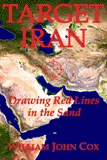e="Target Iran: Drawing Red Lines in the Sand" class="wwscontentsmaller">Target Iran: Drawing Red Lines in the Sand by Mindkind Publications
An excerpt from Target Iran: Drawing Red Lines in the Sand.
A balanced analysis of the security interests of the
United States vis-a-vis Israel requires a careful review of their
security interests and the history of their interaction.
That review demonstrates that Israel will always put its
interest before any other nation, including the United States, if its
leadership believes Israel's existence is at risk.
One should not expect anything different, given the
experience of the Jewish people in Europe during World War II; however, that
experience does not give Israel the right to dictate the foreign policy of
United States, whose interest may diverge from Israel when all risks are
evaluated.
The people of the United States, and those who make international
policy on their behalf, must be mindful that the interests of the two countries
have not always coincided.
Several examples from the history of the past 60 years
are instructive.
Baghdad and Egypt Bombings. Following independence, the Israeli government
encouraged the immigration of Jews from other countries to quickly increase its
population. This was known as making Aliyah
(Hebrew: ascent).
In 1948, more than 140,000 Jews lived in Iraq, making up
one-sixth of Baghdad's population. These
were the descendants of the Jews who chose to remain in 536 B.C., when the
Tribes of Israel were freed from their captivity by the Persian king Cyrus the
Great.
Israeli Zionists encouraged the Iraqi-Jewish population
to leave Iraq; however, the Iraqi government declared Zionism to be a capital
offense, required registration, a renouncing of citizenship and a forfeiture of
property to leave. Many Iraqi-Jews were
able to escape through Iran to Israel; however, many were afraid or unwilling
to disturb the status quo.
Commencing in March 1950, a series of bombings occurred
in Baghdad at the American Cultural Center and Library, the U.S. legation's
information office, and other locations where Jews gathered. The Jewish population was seized with panic,
and ultimately all but a few thousand left the country.
The Mossad denied it was involved in the bombings;
however, the acts served to sour American-Iraqi relations and the rapid
emigration of the population did in fact take place. The British embassy in Baghdad concluded that
the bombings were done by Zionists, and a former CIA senior officer wrote that
they were done by Zionists to "portray the Iraqis as anti-American and to
terrorize the Jews."
The Mossad also recruited a group of Zionist Egyptian
Jews in 1954 to plant bombs in the U.S. Information Service library and other
American targets in Cairo and Alexandria.
The Mossad intended to blame the Muslim Brotherhood for the attacks;
however, the plot failed and the conspirators were arrested and convicted.
The conspiracy was code named "Operation
Susannah," and the failed attempt became known as the "Lavon
Affair" after Israeli defense minister Pinhas Lavon, who was forced to
resign as a result. After denying
complicity for 50 years, the surviving agents were provided with a certificate
of appreciation by Israeli President Moshe Katzav in 2005.
All of these acts of terrorism were denied by Israel, and
historians are divided as to responsibility; however, the adage Cui bono
(Latin: to whose benefit?) often correctly identifies the party that had the
most to gain or the least to lose.
Suez Crisis. In 1956, acting in conspiracy with England
and France, Israel invaded the Sinai Peninsula without warning. The purpose of the invasion was for England
and France to regain control of the Suez Canal, which had been nationalized,
and to remove President Gamal Abdel Nasser from power in Egypt.
(Note: You can view every article as one long page if you sign up as an Advocate Member, or higher).






